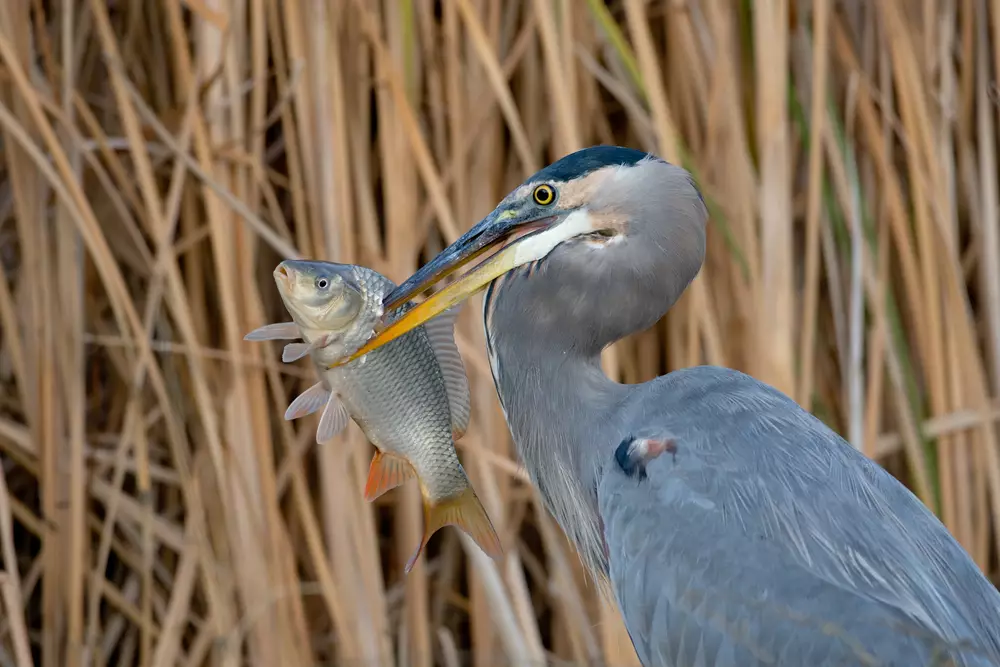A heron is a long-legged wading bird with a sharp beak that is perfectly designed for eating fish. But do herons only eat fish? Let’s take a closer look.
Herons are opportunistic feeders, which means that they will eat whatever food is available to them. In addition to fish, herons have been known to eat frogs, snakes, rodents, and even other birds. Basically, if it can fit in its beak and won’t fight back too much, a heron will likely give it a try.
So why is fish such a big part of a heron’s diet? Well, fish are relatively easy to catch, and they provide the heron with a good source of protein. Fish are also plentiful in many areas where herons live, which makes them an ideal food source.
If you’ve ever seen a heron standing at the edge of a pond or river, you may have wondered what they’re looking for.
Well, one thing they’re definitely on the lookout for is fish! Herons are expert fishermen, and their long beaks and necks help them snag their prey with ease.
These birds typically eat small fish, but they will also go after larger ones if they’re feeling particularly hungry. In fact, herons have been known to swallow fish whole – head, tail, and all!
So next time you see one of these elegant birds by the water’s edge, know that there’s a good chance they’re getting ready to enjoy a delicious seafood meal.

What Does a Heron Bird Eat?
A heron bird’s diet consists mostly of fish, but they will also eat amphibians, reptiles, small mammals, and birds. They are opportunistic feeders and will take advantage of whatever food is available.
Herons typically hunt in shallow water, using their long bill to spear fish or snatch them up with a quick strike.
How Big of a Fish Can a Heron Eat?
Herons are known to be opportunistic feeders and will eat whatever prey is available and within their size range. In general, herons can consume fish that are up to about one-third of their body size.
So, for a typical heron that measures about three feet long, this would mean a fish that’s approximately one foot in length.
Of course, there are always exceptions to the rule. Herons have been known to snag much larger fish on occasion – even ones that are half their body size or more.
But these instances are relatively rare, and usually, only occur when the heron is particularly hungry or desperate for food.
So, if you’re ever wondering how big of a fish a heron can eat, just remember that it really depends on the individual bird and the situation. In most cases though, you can expect them to go for something that’s around one-third their own size.
Do Herons Hunt Or Fish?
Herons are predators that hunt and fish for their food. They use their long necks and legs to wade through shallow water in search of prey.
Herons typically eat small fish, crustaceans, amphibians, reptiles, and insects.
Do Great Blue Herons Eat Fish?
Yes, great blue herons eat fish. They are wading birds that use their long necks and sharp bills to spearfish in shallow water.
Great blue herons typically eat small fish, but they have been known to catch and eat larger fish as well.
Blue Heron Examined; Eats Fish
What Does a Great Blue Heron Eat?
As a Great Blue Heron, you are a carnivore. You have a long, S-shaped neck and a sharp bill that help you snag your prey from the water below. You typically hunt in shallow wetlands and feast on fish, amphibians, reptiles, small mammals, and birds.
Likewise, you’re most active at dawn and dusk when your prey is also most active. But you’re a patient predator—you’ll stand completely still for long periods of time waiting for just the right moment to strike.
When you see your chance, you quickly extend your neck and spear your victim with your bill.
Then you swallow it whole! If you’re feeling starving, you may eat up to three pounds of food per day. That’s about 10% of your body weight!
Conclusion
Yes, a heron does eat fish. The heron is a wading bird that uses its long beak to spear fish.
The heron can also stand still in the water and wait for fish to come to it.